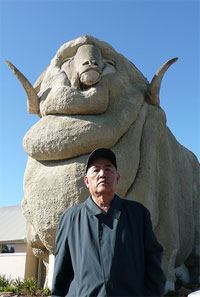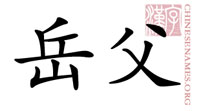In-laws are proverbial, especially the mother-in-law, and Chinese moms-in-law seem to fit every stereotype available, as far as I have heard. I call on you, reader and critic, to help me with stories and wisdom concerning the moms in law because I am unfortunate enough to only have a father in law.
My wife’s mom died suddenly of cancer just a year before we were married and although she never got to know me and never had a chance to fuss over our son, I have a feeling she is responsible for all of this.
 In her place stands my father in law and his relationship to the family is at once endearingly simple and infuriatingly complex. I refer to him as Lao Ba (“Old Dad”) and he and I get along just fine. He lets me be me and I let him be him and we can sit in silence for a long time puffin’ on cigarettes and every now and then getting up to fill two cups of tea. I get his jokes and he gets mine and we often stand by our little pond in the backyard and point out projects in half-sentences and grunts, the way fellas do when they don’t need to talk too much.
In her place stands my father in law and his relationship to the family is at once endearingly simple and infuriatingly complex. I refer to him as Lao Ba (“Old Dad”) and he and I get along just fine. He lets me be me and I let him be him and we can sit in silence for a long time puffin’ on cigarettes and every now and then getting up to fill two cups of tea. I get his jokes and he gets mine and we often stand by our little pond in the backyard and point out projects in half-sentences and grunts, the way fellas do when they don’t need to talk too much.
Our Common Ground & Mutual Understanding
“You see that?” (I point to the sagging fence the chickens keep sneaking through to get at the lotus leaves)
“Hm. Not enough bamboo.” (to patch the hole, which means we have to get more before we start on that project)
“Hm.” (take an offered cigarette and lean in for the light)
“Let’s pull those boards out.” (to patch the hole for now)
In unison: Cha Bu Duo (??? – literally “not lacking much”, but expressing mutual agreement).
That’s pretty much how it works for me and Lao Ba. We talk about the future and where we will eventually settle (America? Germany? The Du? Dali? Morocco? A constantly moving VW van?) and he doesn’t trip out like my own Dad does when I mention that last option. Lao Ba says things like:
“Better build a play pen in that van if you’re gonna be on the road for a while.”
Which puts things in perspective real quick-like.
The Utilitarian Perspective
Lao Ba is indispensable to me because Bean (the nickname I call my wife by) is taking care of my son all the time (breastfeeding, cooing, holding, lulling to sleep etc.) and that leaves just me to sweep the courtyard, clean the rooms and kitchen, prepare food and clean the dishes, work to earn money, sort out other issues like the bank, electricity, water, clothes washing, the slippery moss in our front yard, pulling stranded, sinking chickens out of the pool, feeding our useless hound TofuPi (???) and other such unimportant tasks. I can’t do it alone so I am a big believer in having Lao Ba around to help me with the chores.
Sure: he has a different idea of cleanliness than I do. He’s a superstar when it comes to keeping counters and bowls clean, but he neglects the floors, the corners, and all those spaces where nastiness regroups for an eventual assault on the tabletop. I’ve worked in kitchens since I was 14 years of age so I have a lot of experience battling mold and gunk and all the other enemies of a clean kitchen. Lao Ba loves to say “meiyou banfa,” (????, “there’s no option!”) in fact that is his favorite thing to say because he’s 50-something and back when he was growing up having no choice in the matter was par for course in China.
My Father in Law Fixes Things
I am slowly weening him of that bad habit and he now fixes household objects I couldn’t possibly fix, like the fan, the rice cooker, the electrical cable leading to the lamp above the stairs, the washing machine and other such appliances that usually don’t last much more than a few years in China. That too is a product of his age and his generation: old guys fix stuff until it falls apart completely and I admire that. I need that around my house.
Problem is, Bean and Lao Ba have a very rocky relationship that stretches back to when Lao Ba was a fire breathing, unemployed engineer cooking meals during the day while his wife kept the house afloat working the night shift at the Chengdu Economic Daily. For a man from his generation, there isn’t much more face to lose really. So he was difficult to live with sometimes. He is older now and living with me has bent a few of his iron viewpoints on how things should (“can only be!”) done, but back then, he and Bean fought like cats and dogs.
Tempting Fate
Bean’s mom never smoked a day in her life, but died of lung cancer. Lao Ba is a smokestack. Bean and her mom were like sisters. Lao Ba prepared Bean’s meals all of her life, sent her to and picked her up from school and did most of the discipline. Moms wasn’t really available, which made her even more of a treasure and the time she took out from sleeping to be there for Bean that much more precious.
 I stand in the middle and I have to think of the house and the family. Lao Ba loves his grandson (my son, Dorian) and the feeling is mutual. They get along like grampas and grandsons should and that’s really important. Lao Ba cooks, cleans, fixes and handles stuff around the house, which allows me to breathe and take care of my son and wife and other things I have to do. We need him.
I stand in the middle and I have to think of the house and the family. Lao Ba loves his grandson (my son, Dorian) and the feeling is mutual. They get along like grampas and grandsons should and that’s really important. Lao Ba cooks, cleans, fixes and handles stuff around the house, which allows me to breathe and take care of my son and wife and other things I have to do. We need him.
My wife’s happiness — nay, a woman’s happiness — is the most important factor determining the health of a household. Let it be known:
“If a woman ain’t happy, the house ain’t comfy.”
I like a comfy house. So part of our daily routine is me defusing bombs dropped by one or the other party that risk exploding into a screaming, crying, household disorder-inducing conflagration. That’s just how it is.

Now I hear about Moms-in-law causing all sorts of havoc with their daughters: ostracizing the husband and basically exerting middle-aged to older Dragonlady control over matters and that sounds real taxing (note: Sarah Palin calls them “Mama Grizzlies”). But as far as I have seen, in the families that I have experience with, the moms-in-law are equally indispensable: taking care of the little one, dishing out wisdom like Stockton dishing assists, cooking all the good fixin’s and generally being a force of good and a well of strength for their family.
Tell me a tall tale of in-laws and outlaws in your family.
On the street it really seems like you see grandparents with children more than mothers or fathers. What’s up with that, just working parents? Seems like everyone else is milling around, drinking tea or playing mahjong.
yeah brother here the grandparents do most of the child rearing — we often get quizzical looks because there is no maid around, no gramma around and only when Lao Ba shows up do we look like a “normal family” …
Why is that, is it because both parents are working during the day? During the day I noticed the streets filled with people which makes me wonder what’s going on there with parents, supervising children and the grandparent situation.
In-Laws. I am Canadian Chinese (born and raised) with a Chinese husband. We live in BJ with our nearly 2 year old and my in-laws. My relationship with my FIL is like yours. We can stand around, joke and laugh. But with my MIL… I don’t know where to begin.
I work at home part-time, but 99% of my day is spent taking care of my daughter. We don’t have an ayi. The ILs do the housework and prepare food. My ILs live with us, because their hometown is 2 hrs away by train. I never wanted this “situation” and in some ways I was “cornered” into this, but here we are.
My husband LOVES his mom, while his relationship with his dad is diplomatic at best (unless it’s about Bo Xilai nowadays). Like a “normal” Chinese family – they leave feelings out of the talk (Read: My husband is a poor communicator). About a decade ago, 1-2 years after we started dating, my husband told me that if his mom and I ever had conflict, it’d be my fault.
I think that comment has haunted me to this day. I’d never be good enough.
So… My MIL is an amazing person, but does not know how to “leave it alone”. She is ALWAYS AROUND and it gets stressful. I find my husband completely different when his parents are around. He disagrees. She is a typical woman from her generation: ALL ABOUT FAMILY. She has no hobbies – no reading, no majiang, no favorite tv shows if it means she has no time for the dishes.
When it comes to her granddaughter, she is always watching her like a hawk, afraid she will fall, fearful that she will cry (scream/yell) and amazed she can do the littlest things. They are always tense when she throws tantrums, because Chinese kids don’t. Before they can even get to the yelling/screaming stage, they’ve already been giving what they were looking for. My example is my husband’s obese nephew who only eats meat and has rotting teeth. I would never allow it to even happen!
I think what I find the most difficult is that they (or mainly she) lives with us. If she didn’t live with us, I wouldn’t be explaining my parenting style, or insisting on doing something a certain way as much. I’d just let them spoil her for whatever time they were visiting for. But nope… they have more face time with her than her Daddy does, so I find myself explaining/defending my westernized parenting style every day. It gets tiring.
wow. good luck. in the end the hubby/wifey has to stand with her spouse when it comes to conflict with the in laws. if not, then its unhealthy.